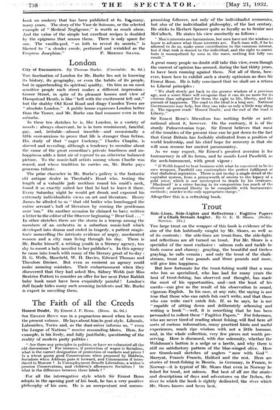The Faith of all the Creeds
Honest Doubt. By Ernest J. P. Bean. (Bern. 6s. 0(1.)
Sin ERNEST BEEN was in a pugnacious mood when he wrote the present volume. He lays about hiMin geat style. Liberals, Labourites, Tories and, as the dust-caier informs us, " even the League of Nations " receive resounding blows. Here, for example, is his lively, and fully justifiable, questioning of the reality of modern party politics :
" Are there any principles in politics, or have we exhausted all the old discussions ? For instance, if protection of wages is Socialism, what is the correct designation of protection of markets and prices ? Is a wheat quota good Conservatism when proposed by Baldwin, Socialism when Addison puts it forward, and Communism if intro- duced in Moscow ? Is Unemployment Benefit Liberalism, a widow's pension Conservatism, and children's allowances Socialism T Or what is the difference between these labels ? "
For all the interrogative style which Sir Ernest. Berm adopts in the opening part of his book, be has a very positive philosophy of his own. He is an unrepentant, and uncom-
promising follower, not only of the individualist economics, but also of the individualist philosophy, of the last century. He sticks to Herbert Spencer quite as loyally as to Senior and McCulloch. He states his view succinctly as follows :
Men's interests are harmonious, but men have not the wisdom to know in advance what those interests are. Each man will, if he be allowed-to do so, make some contribution to the common interest, but if that task is denied to the individual, and the right to contri- bute is monopolized by men in the mass, nothing but folly can result."
A great many people no doubt still take this view, even though the current of opinion has seemed, during the last thirty years, to have been running against them. Not all of them, how- ever, know how to exhibit such a sturdy optimism as does Sir Ernest Bean. He is fully convinced that we shall see a return to Liberal principles : " We shall slowly get back to the greater wisdom of a previous age, and a wiser State will recognize that it can do no more for its citizens than safeguard for them the right to life, liberty, and the
• pursuit of happiness.. The road to the ideal is a long one. National Governments may help, but they can take us only a little way along it. The signpost reads Honest Doubt,' and the end of the road is Liberty."
Sir Ernest Bean's liberalism has nothing feeble or anti- national about it, however. On the contrary, it is of the sturdy Palmerstonian type. Sir Ernest believes that most of the troubles of the present time can be put down to the fact that Great Britain has foolishly abdicated from a position of world leadership, and his chief hope for recovery is that she will soon resume her ancient paramountcy.
As we may expect, Sir Ernest's greatest aversion is for bureaucracy in all its forms, and he assails Lord Passtield, as the arch-bureaucrat, with great vigour
" If Webb hoped to beat business with what he conceived to be its own weapons, Passfield can contemplate the perfect fulfilment of that diabolical aspiration. There is not to-day a single detail of the capitalist system, from a pennyworth of sweets to the legacy of a gold mine, which is not intercepted to death by his creatures. Blackmail ' is a crime having in its composition too much of the element of personal liberty to be compatible with bureaucratic methods ; murder is the only appropriate charge."
Altogether this is a refreshing book.




































 Previous page
Previous page